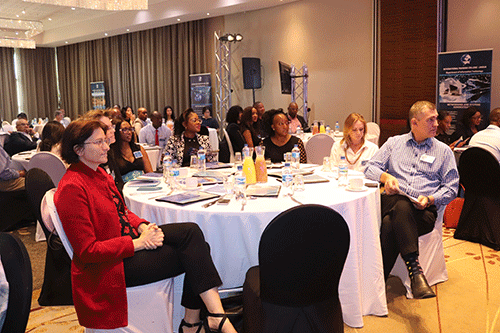The International Training College – Lingua (ITCL) recently held a first-of-its-kind Business Networking Breakfast meeting under the theme ‘Stakeholder Engagement: Actions Leading to Smart Partnerships between Industry and Educational Institutions’.
The purpose of the meeting was for captains of industry and commerce in public and private sectors to network and exchange ideas on business opportunities within the Namibian economy.
Lingua was established 21 years ago, offering language training short courses and today offers education programmes up to master’s level.
The institution has a rich history of empowering its students with academic knowledge and skills and equally integrates them into the labour market through mentorship projects of internships.
Executive director of the education ministry Sanet Steenkamp delivered the keynote address, saying education holds the key to ensuring that workers are prepared for the future and people of all ages should focus on skilling, reskilling, and upskilling.
“Employers complain of a major skills mismatch while many adults are left with little or no access to affordable training and re-skilling opportunities,” she noted.
Steenkamp urged Namibians to make effort to recover the lost learning skills inflicted by the pandemic.
“How do we reimagine education systems and raise the status of education? How do we ensure that learning empowers individuals and societies to both reshape the present and lead us to a more just, sustainable, resilient, and peaceful future?” questioned the executive director.
According to Steenkamp, the world is going through a fundamental change of technological advancement, which is making people in the world obsolete, and so, Namibia, through the Lingua business market, should apportion themselves with a responsibility to that.
Managing director of Green Enterprise Solutions Kehad Snydewel addressed delegates on the value of partnerships between industry and educational institutions.
“I realised that I would not have been able to finish my master’s without having had the corporate experience that I took with me into my studies. But, when I look at new students or fresh graduates, they are often a bit ‘lost’, for lack of a better word, when they come into a work environment,” he noted. Snydewel said his organisation strongly embraces work-integrated learning to help equip graduating students with skills and also helps to capitalise on skills gained by graduates from local universities, emphasising that both the public and private sectors have a role to play in this regard. “Most Namibian professionals started out as interns and with hard work, dedication, and the right attitude, they grew in their professions,” said Snydewel.
He said the traineeship helps to capacitate students with real-world experience to reinforce their theoretical knowledge.



